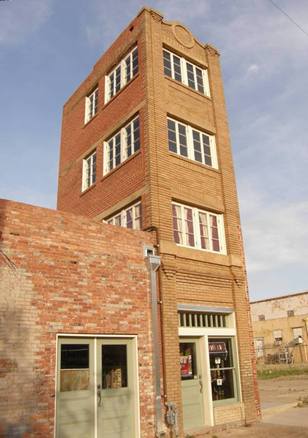|
Before
wildcatters found oil north of town in 1912, Wichita
Falls was just a small county seat cow town.
Within five years, however, Wichita Falls had become the major commercial
and retail center of the North
Texas oil patch. Money flowed as freely as black crude.
Most honest men and women worked hard to earn some of that money.
But Wichita
Falls also had characters like J.D. McMahon, a landman and structural
engineer by training, a con man by inclination. No dummy, McMahon
came up with a clever way to steal – architecture.
McMahon is long gone, but the Newby-McMahon Building still stands,
a monument to gullibility and its enabler, greed.
In 1906, well before the boom, Oklahoma businessman Augustus Newby
built a one-story brick building near the railroad tracks on the east
side of downtown. Keeping the building leased was no sure deal until
the boom, when renters came easily. Newby had died in 1909, but by
1919, the modest structure bulged with seven tenants, including McMahon.
Originally from Philadelphia, McMahon ran a drilling rig construction
company. With office space in great demand, McMahon made it known
that he intended to build a handsome highrise adjacent to the Newby
Building.
Circulating a set of blueprints depicting a skyscrapper that would
tower over the plains, McMahon collected some $200,000 from investors.
(That much money is equivalent to $2.8 million today.)
In a classic case of failing to read the fine print, ingenuous investors
did not notice something unusual about the blueprints for the proposed
skyscrapper: The scale had been calculated in inches, not feet. What
investors took as plans for a 480-foot structure rising roughly 48
stories, actually called for 480 inches in height.
Having raised ample capital, McMahon began construction. No one knew
the new building would sit on land McMahon didn’t even own, but investors
did notice that for some reason the red brick building stopped at
four floors with only enough square footage for one small office per
floor. |
 |
Naturally wanting their money back, investors sued. Unfortunately,
the court found its hands tied. The engineer turned scam artist carefully
never went on record that the building would rise 480 feet, and the
blueprints his lawyer submitted as evidence clearly showed the structure
was designed to rise only 480 inches. Despite his courthouse victory,
in an era when litigants sometimes resorted to appeal by six-shooter,
McMahon found it expedient to leave Wichita
Falls.
By 1922, he was vice president of the Rome Power, Gas and Electric
Light Co. in New York. Researchers have not yet found what became
of him after that, but assuming he might have been about 30 in 1919,
he could have lived into the1960s. Likely investing his ill-gotten
gains from Wichita
Falls, he well could have gotten a kharmic payback when the stock
market crashed in 1929.
At first Wichita
Falls civic leaders were embarrassed by the building and the scam
behind it, but in 1920 New York cartoonist Robert Ripley featured
the structure as the world’s littlest skyscraper and all but those
who got scammed began to see the humor in it.
In time, the oil boom faded and then came the Great Depression. The
building stood vacant for several years and then a fire heavily damaged
it in 1931. After World
War II, it hosted a variety of tenants and survived several close
calls with demolition. Owned for a time by the Wichita County Heritage
Society, the building has been restored and is again in private hands.
These days, the Newby-McMahon Building is a registered historical
landmark and a popular tourist attraction.
© Mike Cox
- March 27, 2014 column
More "Texas Tales"
See Wichita
Falls, Texas
Related Topics: People
| Columns | Texas
Town List | Texas
Order Books by Mike Cox |
|
|